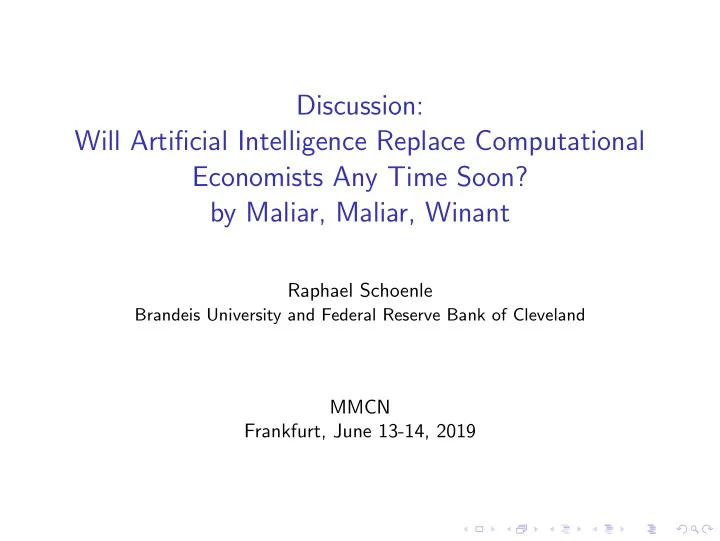

Discussion: Will Artificial Intelligence Replace Computational Economists Any Time Soon? by Maliar, Maliar, Winant Raphael Schoenle Brandeis University and Federal Reserve Bank of Cleveland MMCN Frankfurt, June 13-14, 2019
Motivation ◮ Great paper: ◮ Important research question: ◮ Can a generic AI algorithm replace the need for computational economists to write model-specific code? ◮ Answer: No! It’s complicated ... My lesson learned: Efficient use will need experts to choose best implementation even if a lot is standardized. We can probably massively augment our computational capacity. ◮ Particular contributions: ◮ Elegant, clearly written “cookbook” of machine learning applied to economics ◮ Presentation of a generic, non-supervised deep-learning algorithm with one static objective function
Summary 1/2 ◮ What’s in the cookbook? ◮ Elegant formulation of commonly faced dynamic stochastic optimization problem as a single optimization problem, with two possible objective functions: ◮ life-time reward function ◮ total sum of squared residuals from model equations, e.g. Euler (relevant if there is more than a single agent) ◮ Solution technique: deep learning which arises naturally from decision rules nested over time ◮ employs stochastic gradient method ◮ approximates policy function ◮ assume full knowledge of the model ◮ does not need wide data availability due to simulations ◮ Specific recipe: Application to consumption-savings problem
Summary 2/2 ◮ Advantages/disadvantages of the approach discussed: ◮ The math is simple! ◮ Linear, not quadratic growth of the number of parameters with dimensionality ◮ Approximates kinked functions naturally ◮ Represents complicated structures due to deep-learning ◮ Technology-intensive: ideally, use Google Cloud TPU, Tensorflow or Pytorch software – a high fixed cost, but a technological improvement (graph representation)
Discussion Overview Next: ◮ A layperson’s questions ◮ 2 comments
Comment 1: Comparison to the literature, in particular reinforcement-learning ◮ How does your paper compare to Duarte (2018), both formally and in terms of content? ◮ In terms of content: ◮ Your approach assumes that the model is known while reinforcement learning does not and is model-free ◮ Online learning in reinforcement learning leads to some tradeoffs ◮ Your formulation proposes offline learning in a single optimization problem setting ◮ Can you flesh out 2 cases where either approach does clearly better? The reader would like some guidance what to look for when making algorithmic choices.
Comment 1: Comparison to the literature, in particular reinforcement-learning ◮ How does your paper compare to Duarte (2018), both formally and in terms of content? ◮ Formally: ◮ Duarte explicitly compares reinforcement learning approximate solutions to exact numerical benchmarks ◮ Overall conclusion: can handle up to 10 dimensions well ◮ High-dimension application still missing in draft... Can you be more specific about its features?
Comment 2: Careful comparisons of approaches? ◮ The reader would like some tables with more evaluations of your algorithm, and comparisons to other algorithms ◮ Explicitly compare exact and approximate solutions where possible ◮ Large-scale capacities? (e.g. multiproduct pricing problem as in Alvarez) ◮ Performance in terms of time, and costs (e.g. Google Cloud)? ◮ Can you present more of a cookbook, perhaps with some stylized “recipes”? When does a particular algorithm do well? What are some clearcut criteria - is it ultimately research $? (time yourselves) What about carbon emissions? ◮ Given complexity of attention allocation, some clear discussion of pros and cons of algorithms in the context of specific examples might be more useful
Comment 2: Careful comparisons of approaches?
Comment 2: Careful comparisons of approaches?
Conclusion ◮ Very nice paper - great exposition of generic AI algorithm. ◮ Can become a useful guide as an AI cookbook.
Recommend
More recommend